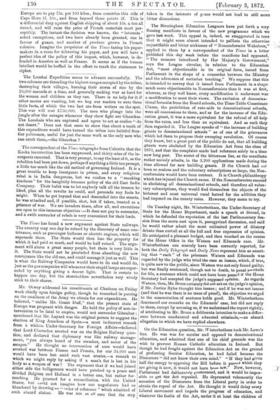On Tuesday night, Mr. Winterbotham, the Under-Secretary of State for
the Home Department, made a speech at Stroud, in which he defended the reputation of the last Parliamentary Ses- sion from the scorn cast upon it, panegyrized discussion, and said he would rather admit the most unlimited power of dilatory debate than curtail at all the full and free expression of opinion. He anticipated a pleasant budget, and then touched on the course of the Home Office in the Watson and Edmunds case. Mr. Winterbotham can scarcely have been correctly reported, for both the Daily Telegraph and Daily News represent him as assert- ing that " each " of the prisoners Watson and Edmunds was regarded by the judge who tried the case as insane, which, if true, is quite new to the public, since Watson was not only found guiltry, but was finally sentenced, though not to death, to penal snreitude for life, a sentence which could not have been passed it the Home Secretary had accepted the judge's supposed opinion. As regards Watson, then, Mr. Bruce certainly did not act on the judge's opinion, if Mr. Justice Byles thought him insane ; and if he was not insane (and that he was there is no trace of proof), the objection we urged to the commutation of sentence holds good. Mr. Winterbotham denounced our remarks on the Edmunds' case, but did not reply to them, except by accusing us, if we understand the report rightly, of attributing to Mr. Bruce a deliberate intention to make a differ- ence between uneducated and educated criminals,—an absurd allegation to which we have replied elsewhere.






































 Previous page
Previous page